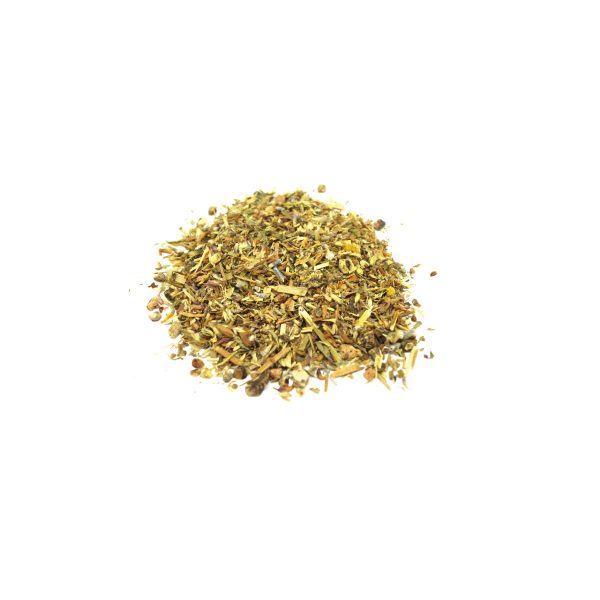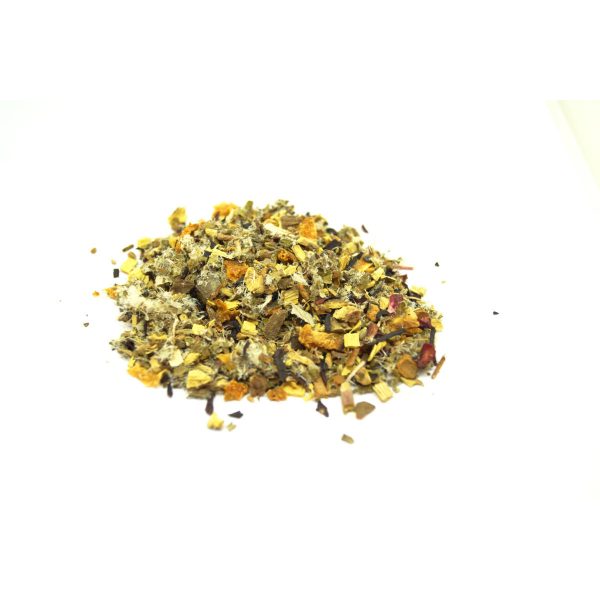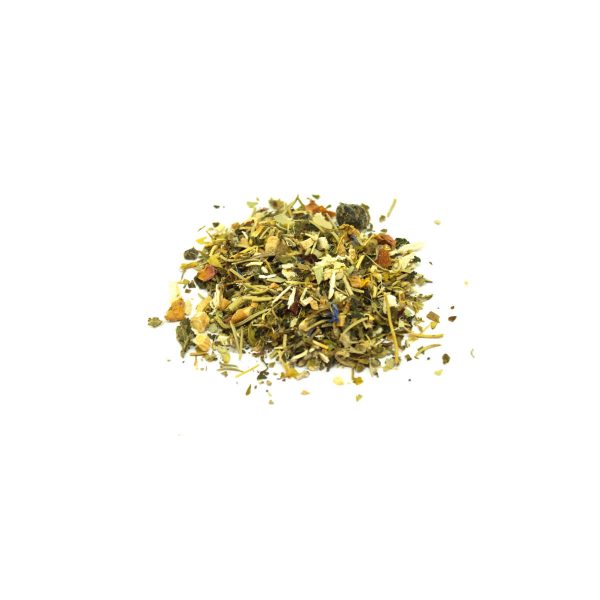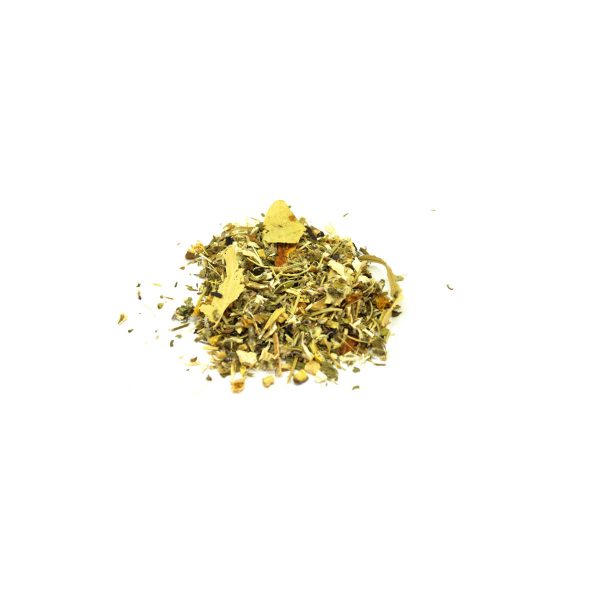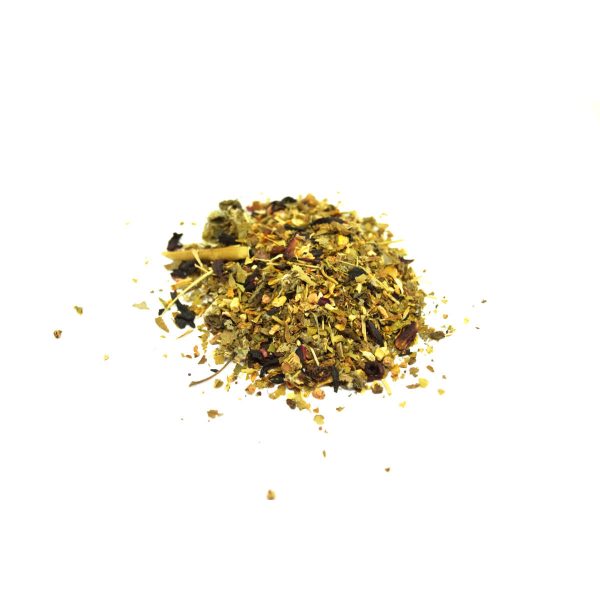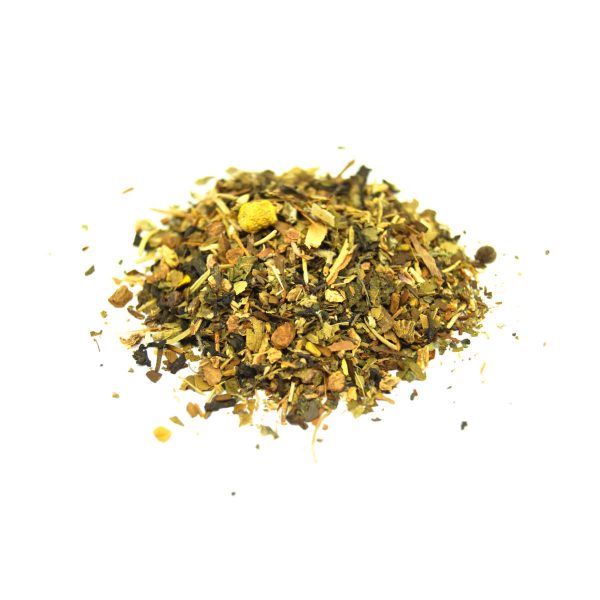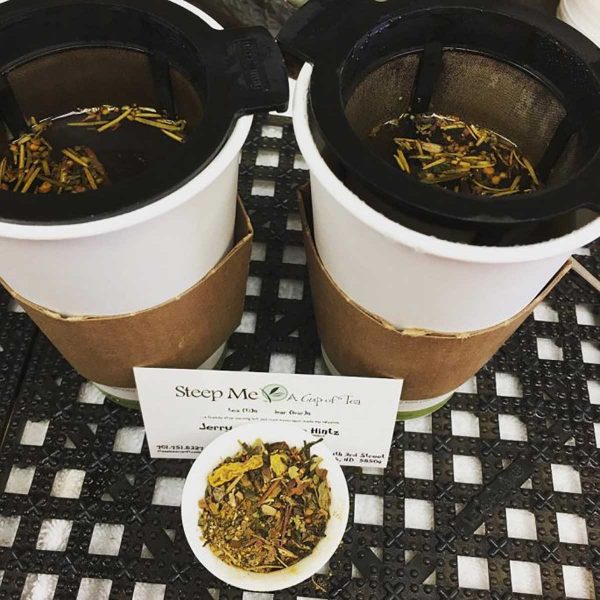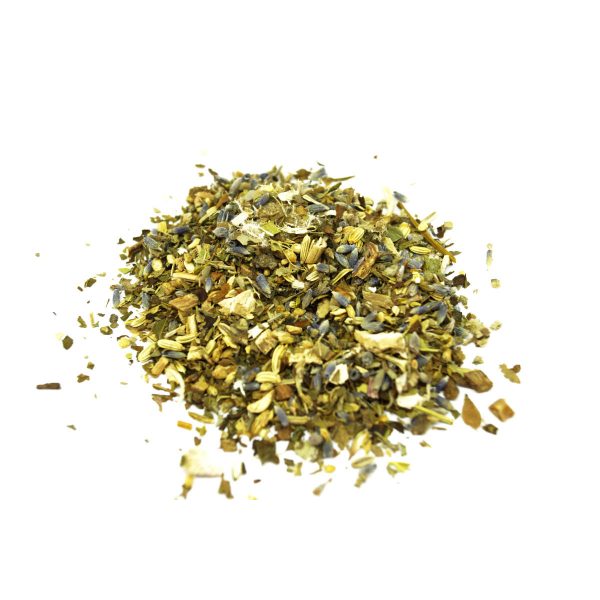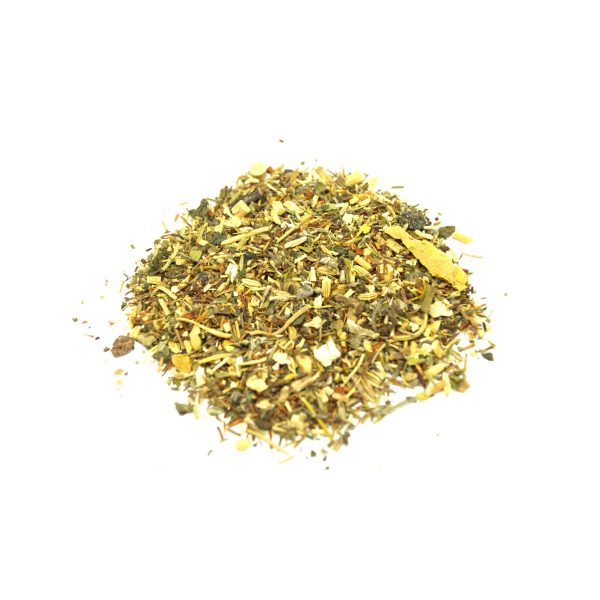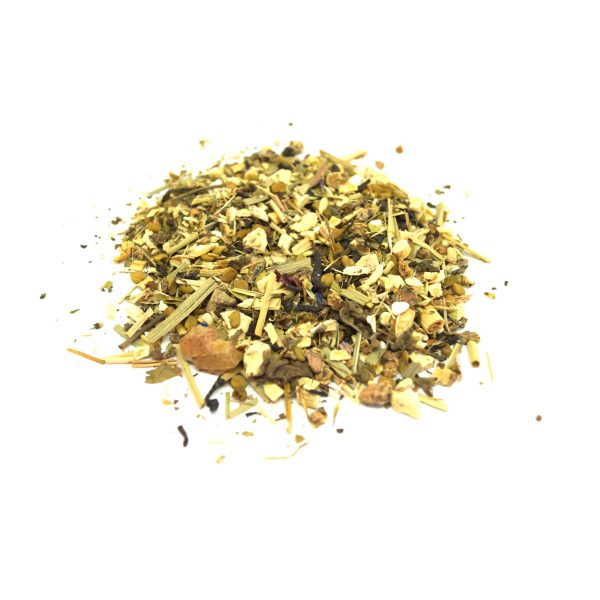With over 400 different kinds of loose tea that will exceed all tea lover’s expectations. You’re sure to find something you will love! All handcrafted by us in North Dakota.
Description
Blender’s Notes Hypothyroidism:
Steep Me Self-Help Tea combinations are a wonderful way to get health benefits outside of the standard tea leaf. This combination of herbs helps support, maintain, and nourish a deficient thyroid. Hypothyroidism is when there are not enough thyroid hormones in your bloodstream and your metabolism slows down. Hypothyroidism happens when your thyroid does not create and release enough thyroid hormone into your body. This slows your metabolism down, affecting your entire body. Also known as underactive thyroid disease, hypothyroidism is common. When your thyroid levels are extremely low, this is called myxedema. The thyroid gland is a small, butterfly-shaped organ located in the front of your neck just under the voice box (larynx). Picture the middle of the butterfly’s body centered on your neck, with the wings hugging around your windpipe (trachea). The main job of the thyroid is to control your metabolism. Metabolism is the process that your body uses to transform food to energy your body uses to function. The thyroid creates hormones T4 and T3 to control your metabolism. These hormones work throughout the body to tell the body’s cells how much energy to use. They control your body temperature and heart rate. When your thyroid works correctly, it is constantly making hormones, releasing them, and then making new hormones to replace what has been used. This keeps your metabolism functioning and all your body’s systems check. The amount of thyroid hormones in the bloodstream is controlled by the pituitary gland, which is in the center of the skull below the brain. When the pituitary gland senses either a lack of thyroid hormone or too much, it adjusts its own hormone (thyroid stimulating hormone, or TSH) and sends it to the thyroid to balance out the amounts. If the amount of thyroid hormones is too high (hyperthyroidism) or too low (hypothyroidism), the entire body is impacted. Hypothyroidism can have a primary cause or a secondary cause. A primary cause is a condition that directly impacts the thyroid and causes it to create low levels of thyroid hormones. A secondary cause is something that causes the pituitary gland to fail, which means it cannot send thyroid stimulating hormone (TSH) to the thyroid to balance out the thyroid hormones. Primary causes of hypothyroidism are much more common. The most common of these primary causes is an autoimmune condition called Hashimoto’s disease. Also called Hashimoto’s thyroiditis or chronic lymphocytic thyroiditis, this condition is hereditary (passed down through a family). In Hashimoto’s disease, the body’s immune system attacks and damages the thyroid. This prevents the thyroid from making and releasing enough thyroid hormone. The other primary causes of hypothyroidism can include: ~ Thyroiditis (inflammation of the thyroid). ~ Treatment of hyperthyroidism (radiation and surgical removal of the thyroid). ~ Iodine deficiency (not having enough iodine — a mineral your thyroid uses to make hormones – in your body). ~ Hereditary conditions (a medical condition passed down through your family). Hypothyroidism: Symptoms, Causes, Treatment & Medication (clevelandclinic.org)
This blend is based on our mazing Puerh Tea. Puerh Tea ~ pronounced as ‘poo-air,’ is a unique variety of fermented tea originally cultivated in the Yunnan province of China. This tea undergoes a unique post-fermentation process, which allows the tea leaves to mature over time, leading to its characteristic deep, robust flavor and dark color. Often likened to a fine wine, the value of Pu-erh tea can increase with age. The fermentation process produces natural probiotics that can support gut health, enhance digestion, and potentially relieve discomfort related to bloating. Pu-erh tea could potentially aid in weight loss. Puerh is believed to help increase metabolism, enhance the body’s ability to burn fat, and prevent the formation of fat cells. Sage was added because it shows a decrease in benign and malignant thyroid disease. Next, we added Ashwagandha. Ashwagandha is an adaptogenic herb, has been used in traditional Ayurvedic medicine for centuries to help balance the body’s various systems and its natural properties are anti-inflammatory, neuroprotective, adaptogenic, hematopoietic, meaning it may support stem cell function, sleep-inducing, anti-anxiety. Ashwagandha is believed to help regulate thyroid hormone production by supporting the proper functioning of the adrenal glands. This, in turn, can help alleviate some of the symptoms of hypothyroidism. St. John’s Wort was also included because it has been used since ancient times to treat depression, restlessness, nervousness, and insomnia. St. John’s wort may also help ease pain felt in muscles and joints as well as decrease feelings of fatigue which can come with a diagnosis of Hypothyroidism. We also added Black Cohosh. We deal with pollutants, environmental toxins, UV rays, processed food, and even some medicines can lead to oxidative stress. This results in free radical damage in your body. When free radicals enter your cells and damage your DNA, it leads to disease. As the name suggests, antioxidants fight oxidative damage–and black cohosh is packed with potent antioxidants. This means it could help prevent inflammation and diseases like cancer and even combat signs of aging. Black Cohosh benefits hormonal balance in women by mimicking estrogen. In addition, it can help relieve symptoms of polycystic ovary syndrome (PCOS), including hot flashes, cramping, and irregular periods. Black cohosh acts as an anti-inflammatory, stopping cells that trigger your body’s inflammatory response and because the same cellular pathways that trigger inflammation also set off allergic reactions, black cohosh could help relieve chronic allergies and allergy symptoms and can help manage hypothyroidism. Gymnema was added and it is translated as “sugar destroyer.” because Gymnema leaves contain a compound called gymnemic acid that suppresses the taste of sugar. It is known for its potential benefits in managing diabetes and reducing sugar cravings and has benefits due to its potential impact on blood sugar levels and metabolic health. Gymnema may block sugar and fat absorption in the body, the effect of which may be useful in treating obesity, diabetes, and high cholesterol.
Next, we included Turmeric Root, Cinnamon, and Cloves. Turmeric can help those with autoimmunity and Hashimoto’s reduce inflammation, support the gut, and detoxify heavy metals from the body. Turmeric’s medicinal benefits can mostly be attributed to compounds called curcuminoids. Curcumin is an active component in turmeric. Curcumin is a primary curcuminoid known for its powerful anti-inflammatory and antioxidant effects. Modern medicine recognizes the importance of turmeric and confirms the legitimacy of many of its traditional applications. More than 20,000 scientific papers and 488 clinical trials have been conducted to assess both turmeric and curcumin, and their many health benefits. Examples of traditional and Ayurvedic uses of turmeric include Relieving inflammation and arthritis ~ Treating respiratory conditions ~ Treating allergies ~ Treating wounds ~ Treating conjunctivitis ~ Addressing issues to do with skin cancer ~ Helping with urinary tract infections ~ Helping digestive problems like indigestion, gas, colic, abdominal pain, and distension ~ Expelling phlegm ~ Improving circulation ~ Improving energy levels ~ Reducing menstrual symptoms. Steep Me Seaweed Blend was included for their high iodine characteristics. Iodine is a mineral that is needed to make thyroid hormone. Iodine deficiency can cause hypothyroidism, which is a condition where the thyroid gland does not produce enough thyroid hormone. Hypothyroidism can lead to symptoms such as fatigue, weight gain, cold intolerance, and goiter. However, too much iodine can also cause thyroid problems, such as hyperthyroidism, which is a condition where the thyroid gland produces too much thyroid hormone. Hyperthyroidism can cause symptoms such as nervousness, weight loss, heat intolerance, and palpitations. We also included Nettles. Nettle can help turn around iodine deficiency, making it particularly beneficial to those with underactive thyroids. Nettle contains other important vitamins and minerals as well, including Vitamins A and B6, calcium, iron, and magnesium. Nettle is also a source of selenium, a trace mineral vital to proper thyroid functioning. Ginger is another powerful anti-inflammatory herb that can benefit those with hypothyroidism. It has many health benefits, including anti-inflammatory, antioxidant, and antibacterial properties. Ginger has been shown to help reduce inflammation in the body and may help support healthy thyroid function. Additionally, ginger can help soothe digestive issues, which are common among those with hypothyroidism. And finally, we added Licorice. Licorice is a popular herb in traditional Chinese medicine, and it is believed to have thyroid-supporting properties. Licorice may help improve the conversion of the inactive thyroid hormone T4 to the active hormone T3, which can be beneficial for those with hypothyroidism. However, it is important to note that licorice should be used with caution, as it can cause side effects, such as increased blood pressure, in some individuals.
NOTE: “This/these claim(s) has/have not been evaluated by the Food and Drug Administration. This product is not intended to diagnose, treat, cure or prevent any disease.”
Features Hypothyroidism:
- Leaves can be infused all day! (They will not get bitter)
- Lots of individual flavor based on the ingredients
- All Wildcrafted Herbs
- All Organic where Wildcrafted is not available
- Sweet and Minty ~ Smooth Taste
- Light Colour Cup of Tea
- Full of natural antioxidants and Low in Tannins and Very Hydrating
- Sample Size ~ 1 oz will make 8-10 16 oz teas
- Sealed Bag ~ 4 oz will make 32-40 16 oz teas
- Iced Tea ~ Always Double the amount of Tea for the same size cup!
- Per Serving ~ 1 tsp per 6 oz of H2O
- Recommend 3 tsp Per Day – resteep leaves 2-3 times
- Caffeine: Low
Ingredients: Steep Me Proprietary Organic Blend of Dark Tea from Yunnan Province in China aged by Microbial Fermentation with Strawberry Pieces and Hazelnut Essential Oil, Sage Leaf, Ashwagandha Root, St. John’s Wort Leaf, Black Cohosh, Gymnema Silvestre Leaf, Turmeric Root, Cinnamon Chips, Cloves, Steep Me Seaweed Blend, Nettles, Ginger Root and Licorice Root.
CONTAINS: NUTS(Hazelnut) & SHELLFISH – (Steep Me Seaweed Blend)
Alternatively, try our Lifestyle Phyto~Nutrition Tea OR Weight Loss Phyto~Nutrition Tea OR Endocrine Support Micro~Nutrition Capsules OR Pituitary Health Phyto~Nutrition Capsules
Not Safe for Pregnancy
Not Safe for Breastfeeding
Not Safe with Antidepressant or Anxiety Medication (SSRI or MAOI)
NOTE: May Contain Shell Fragments Consumption of this product may cause a serious or life-threatening reaction in persons with allergies to fish or shellfish.
NOTE: These claim(s) have/have not been evaluated by the Food and Drug Administration. The products offered by Steep Me Tea Apothecary -Franchisees – Wholesalers – Influencers or SteepMe.com are not intended to treat, cure, or prevent any illness or disease. If you have or suspect that you have a medical problem, consult with your physician for diagnosis or treatment. All gender specific blends are based on Gender Assigned at Birth. Use herbs as per instructions and always watch for any allergic reactions. You should always carefully read all product packaging and labels. Always consult your physician or health care provider before using any herbal products, especially if you have a medical problem. Steep Me Tea Apothecary and SteepMe.com and/or its proprietors assume no liability for any injury, illness or adverse effects caused by the misuse and/or use of the information or products presented
NOTE: When using Teas, Capsules, Tinctures and Micro-Nutrition to help with your ailment ~ please remember this is a marathon ~ we recommend an investment of time of at least 6 months to see positive change. Any gender specific blends are based on gender assigned at birth.
“Processed in a facility that also processes food containing milk, egg, fish, peanut, shellfish, soy, tree nuts, wheat, and sesame. May contain traces of milk, egg, fish, peanut, shellfish, soy, tree nuts, wheat, and sesame.”
Additional information
| Weight | N/A |
|---|---|
| Size | , , |
Related products
Allergy
From: $16.00
This allergy tea is great for seasonal allergies or for those who suffer long term. Really helps relieve the nasal drip in the back of the throat giving great relief. A great way to clear up your sinuses and help sooth your throat.
Select options
This product has multiple variants. The options may be chosen on the product page
Cough Drop
From: $15.00
Looking to help with the nagging cough that happens occasionally with a cold. This is a great option to help!
Select options
This product has multiple variants. The options may be chosen on the product page
High Blood Pressure ~~ GRAS Certified Ingredients
From: $19.00
A great caffeine free blend of wild crafted herbs of Hibiscus and and Hawthorne that help keep your pressures low. Great tea before bed.
Select options
This product has multiple variants. The options may be chosen on the product page
Hitch ~ Women’s Tea ~~ GRAS Certified Ingredients
From: $18.00
A great overall women's health tea - use on a daily basis to maintain health benefits. Not meant for women below the age of 26. This women's tea is a great hormone balancing tea with great response from the users on reduced inflammation and reduced anxiety. A great sweet taste...give it a try today!
Select options
This product has multiple variants. The options may be chosen on the product page
Irritable Bowel Syndrome ~ IBS
From: $15.00
Looking for a great help to your Irritable Bowel Syndrome to slow down your going...this is a great blend that has been with us since 2008 to help with all your IBS concerns.
Select options
This product has multiple variants. The options may be chosen on the product page
Kick~in Cholesterol
From: $15.00
Select options
This product has multiple variants. The options may be chosen on the product page
Red Blood Cell
From: $16.00
Wonderful combination of herbs and teas to help you increase your red blood cell count. Plus, a great tea to help exercise recovery! Feel better!
Select options
This product has multiple variants. The options may be chosen on the product page
Throat Therapy
From: $15.00
Select options
This product has multiple variants. The options may be chosen on the product page


